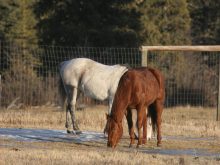Committee studying a bill to ban live horse export for slaughter had difficulty finding producers who would testify
REGINA — People who raise horses for the overseas meat market were afraid to testify before the standing agriculture committee during its recent study of a bill to ban the air export of live horses.
Conservative agriculture critic and Alberta Foothills MP John Barlow said some were harassed and bullied and wanted no part of the study, even though they could lose their livelihood if the bill is passed.
Related stories:
Read Also

Farmers urged to be grain-safe this fall
Working around grain bins comes with risk, from farmers falling to drowning in grain: Experts have five tips to help avoid grain-related accidents this harvest.
Prime minister Justin Trudeau included the ban on live horse exports for slaughter in then-agriculture minister Marie-Claude Bibeau’s mandate letter in 2021. However, Ontario MP Tim Louis shepherded a private member’s bill, C-355, through the committee.
The bill addresses transport, not slaughter, and will continue its legislative journey to third reading in the Commons and then the Senate.
The issue arose from animal welfare concerns. The Canadian Food Inspection Agency said 47,000 horses were transported by air in the last 10 years, mainly to Japan. Five animals died in transit.
Barlow said decisions should be based on facts rather than emotion, but the committee had difficulty finding producers who would testify.
“They were honest. They just said, ‘you know what, we’ve been harassed, we’ve been intimidated, we’ve been threatened,’ so it was almost impossible to get people to come and tell their story at committee.”
One producer agreed to speak if anonymity was granted. Others provided emails, police reports and recorded messages of things that had happened on their farms, he said.
Barlow would like to prevent this from happening again. He said witnesses should be protected by parliamentary privilege.
“A certain part of the population has intimidated them to the point where they feel frightened to come in and appear, and that’s just unacceptable to me,” Barlow said in an interview.
“I think it’s important that we send a statement as a committee, that that’s just not going to be tolerated and witnesses should feel safe and protected.”
He said there are other examples, such as his own Bill C-275, regarding unauthorized people entering barns, where producers were harassed.
Barlow criticized public figures who use social media to encourage intimidation and bullying.
The anonymous producer who did speak to the committee said she was a Metis woman who was able to make the family farm financially sustainable by shipping horses.
She said there is “a staggering amount of ignorance about Indigenous culture in regard to the care and respect of Indigenous-owned horses.”
She said her family is not in a financial position to keep horses only for recreational use.
“Selling draft foals to our exporter allows us to keep and maintain horses for farming, to feed livestock, to handle cattle, to trap, to train and to connect with Metis and First Nations communities through horse trading and rallies.”
Barlow said even larger industry representatives would not come to committee despite knowing they will be affected by the legislation.
“Unfortunately, by staying on the sidelines, this legislation passed and it’s going to go on to the Senate,” he said.
After the bill passed at committee, Barlow moved that the clerk compile a report on the instances described by potential witnesses. If the committee decides there is enough information for the speaker to rule a breach of privilege, then the report will go to the House of Commons.
The House of Commons Procedure and Practice states that “witnesses appearing before committees enjoy the same freedom of speech and protection from arrest and molestation as do members of Parliament.”
It says tampering with a witness or trying to stop a witness from testifying at a committee may be a breach of privilege.
Barlow said a ruling would send a message that the House would take steps to investigate harassment or intimidation.
“Policy and legislation should not be decided by the vocal aggressive minority that’s out there,” he said.
“It should be decided on facts and expert testimony and science, and that clearly didn’t happen in this case.”
He expects the report to be completed before the House rises for the summer.


![Conservative agriculture critic and Alberta Foothills MP John Barlow said some [people who raise horses for the overseas meat market] were harassed and bullied and wanted no part of the study, even though they could lose their livelihood if the bill is passed. | File photo](https://static.producer.com/wp-content/uploads/2024/04/30150023/03-BJM121610horse-feedlot.jpg)













